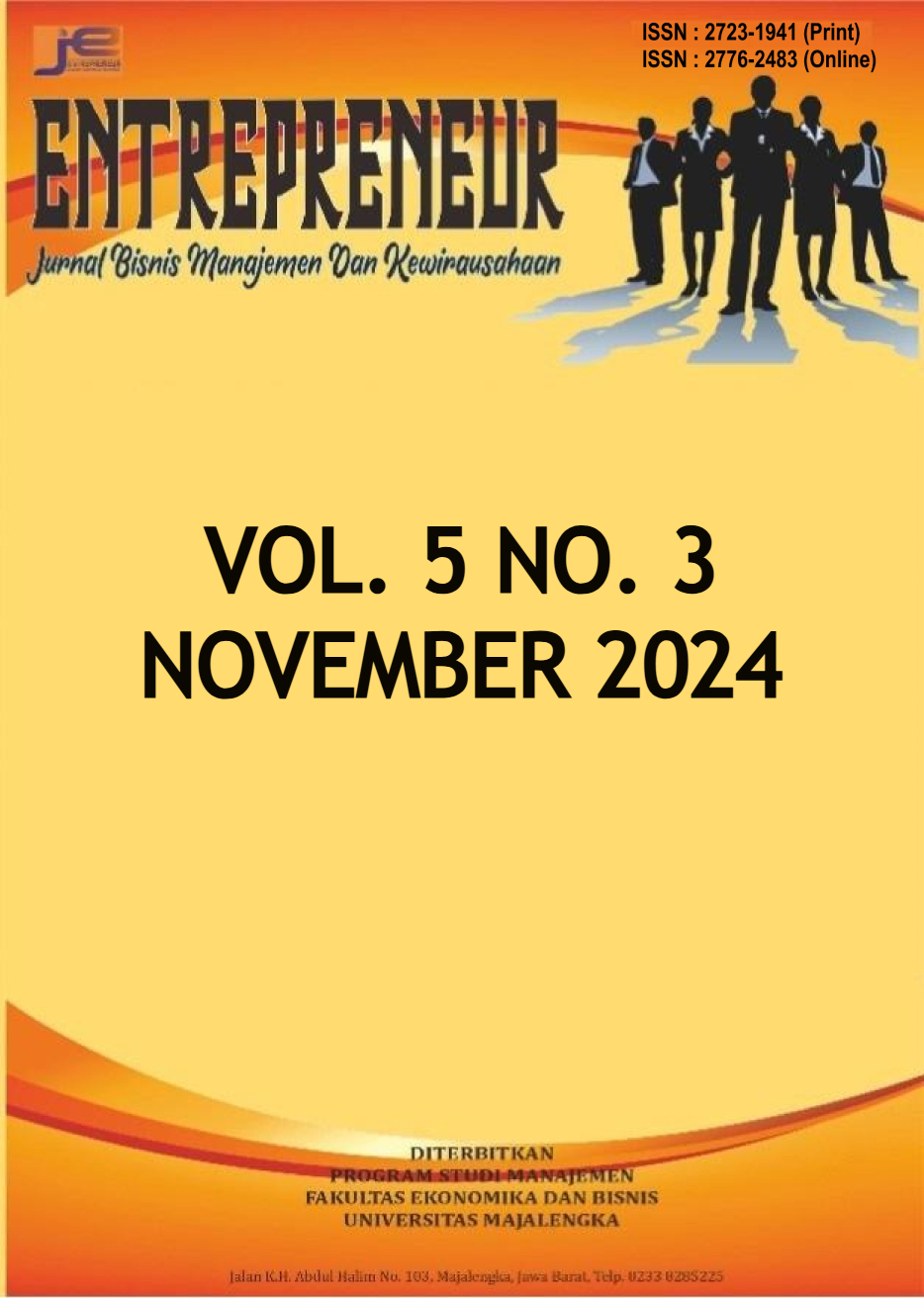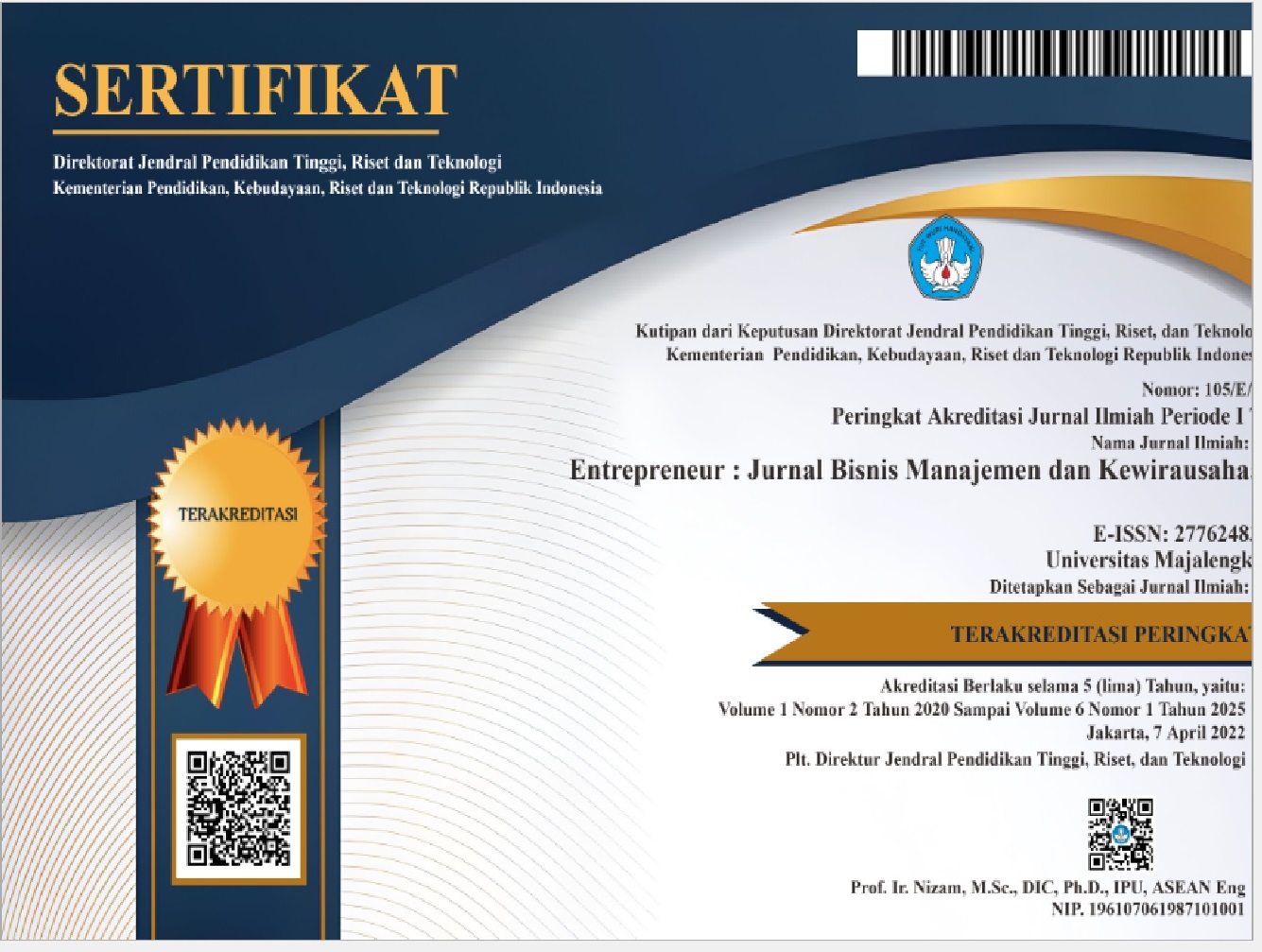Pengaruh Dimensi Corporate entrepreneurship dan Performa Firma: Sebuah Studi Kualitatif
DOI:
https://doi.org/10.31949/entrepreneur.v5i3.9216Abstract
Corporate entrepreneurship is an entrepreneurial activity done at a well-established firm level, to help the firm adjust to the dynamic market by pushing the innovation ability and venturing for business in the company. Despite being interestingly important, not many companies realize how important corporate entrepreneurial mindset is for the sustainability of the business. This research aims to prove how Corporate entrepreneurship and its dimensions can shape the firm’s reputation and growth for a long time. This research was done by the systematic literature review (SLR) method from well-reputed journal articles based on the SCOPUS database to prove the effectiveness of Corporate entrepreneurship dimensions over firm performance. From this research, we found that Corporate entrepreneurship will affect the firm’s performance, especially financial performance. The dimensions created a mindset of proactiveness that will lead to the wish for further research that focused on the Corporate entrepreneurship dimensions with more varied sectors and wider countries on the scope.
Keywords:
Corporate entrepreneurship, Corporate entrepreneurship dimensions, firm performanceDownloads
References
Acs, Z. J., Audretsch, D. B., Braunerhjelm, P., & Carlsson, B. (2011). Growth and Entrepreneurship. Small Bus Econ. https://doi.org/10.1007/s11187-010-9307-2
Akomeah, E., Bentil, P., & Musah, A. (2018). The Impact of Capital Structure Decisions on Firm Performance: The Case of Listed Non-Financial Institutions in Ghana. International Journal of Academic Research in Accounting, Finance and Management Sciences, 8(4). https://doi.org/10.6007/ijarafms/v8-i4/5050
Anderson, B. S., & Eshima, Y. (2013). The influence of firm age and intangible resources on the relationship between entrepreneurial orientation and firm growth among Japanese SMEs. Journal of Business Venturing, 28(3), 413–429. https://doi.org/10.1016/j.jbusvent.2011.10.001
Asogwa, C. I., Ugwu, O. C., Uzuagu, A. U., Abolarinwa, S. I., Okereke, G. K. O., Anorue, H. C., & Moghalu, F. A. (2020). Absorptive Capacity, Business Venturing and Performance: Corporate Governance Mediating Roles. Cogent Business and Management, 7(1). https://doi.org/10.1080/23311975.2020.1839157
Back, P., & Bausch, A. (2019). Not If, But How CEOs Affect Product Innovation: A Systematic Review and Research Agenda. International Journal of Innovation and Technology Management, 16(3). https://doi.org/10.1142/S0219877019300015
Bierwerth, M., Schwens, C., Isidor, R., & Kabst, R. (2015). Corporate entrepreneurship and performance: A meta-analysis. Small Business Economics, 45(2), 255–278. https://doi.org/10.1007/s11187-015-9629-1
Boudreaux, C. J. (2020). The Importance of Industry to Strategic Entrepreneurship: Evidence from the Kauffman Firm Survey. Journal of Industry, Competition and Trade, 20(1), 93–114. https://doi.org/10.1007/s10842-019-00310-7
Boukamcha, F. (2019). The effect of transformational leadership on corporate entrepreneurship in Tunisian SMEs. Leadership and Organization Development Journal, 40(3), 286–304. https://doi.org/10.1108/LODJ-07-2018-0262
Cohen, W. M., & Levinthal, D. A. (1990). Absorptive Capacity: A New Perspective on Learning and Innovation. In Source: Administrative Science Quarterly (Vol. 35, Issue 1).
Diamantidis, A. D., & Chatzoglou, P. (2019). Factors affecting employee performance: an empirical approach. International Journal of Productivity and Performance Management, 68(1), 171–193. https://doi.org/10.1108/IJPPM-01-2018-0012
Do, T. T. P., & Luu, D. T. (2020). Origins and consequences of intrapreneurship with behaviour-based approach among employees in the hospitality industry. International Journal of Contemporary Hospitality Management, 13(12), 3949–3969. https://doi.org/10.1108/IJCHM-05-2020-0491
Fis, A. M., & Cetindamar, D. (2021). Unlocking the Relationship between Corporate Entrepreneurship and Firm Performance. Entrepreneurship Research Journal, 11(1). https://doi.org/10.1515/erj-2018-0213
Garrett, R. P., & Covin, J. G. (2015). Internal Corporate Venture Operations Independence and Performance: A Knowledge-Based Perspective. Entrepreneurship: Theory and Practice, 39(4), 763–790. https://doi.org/10.1111/etap.12059
Hornsby, J., Peña-Legazkue, I., & Guerrero, M. (2013). Guest editorial: The role of corporate entrepreneurship in the current organizational and economic landscape. In International Entrepreneurship and Management Journal (Vol. 9, Issue 3, pp. 295–305). https://doi.org/10.1007/s11365-013-0255-6
Hornsby, J. S., Bloodgood, J. M., Hayton, J., & Kuratko, D. F. (2013). Network legitimacy diffusion: A model for corporate entrepreneurship. International Entrepreneurship and Management Journal, 9(3), 307–322. https://doi.org/10.1007/s11365-013-0256-5
Jiménez-Barrionuevo, M. A. M., Molina, L. M., & García-Morales, V. J. (2019). Combined influence of absorptive capacity and corporate entrepreneurship on performance. Sustainability (Switzerland), 11(11). https://doi.org/10.3390/su11113034
Jiménez-Barrionuevo, M. M., García-Morales, V. J., & Molina, L. M. (2011). Validation of an instrument to measure absorptive capacity. Technovation, 31(5–6), 190–202. https://doi.org/10.1016/j.technovation.2010.12.002
Khalil, M. A., Khalil, M. K., & Khalil, R. (2022). Passive but defiant: the role of innovative capabilities in knowledge management and corporate entrepreneurship. Journal of Entrepreneurship in Emerging Economies, 14(3), 422–448. https://doi.org/10.1108/JEEE-08-2020-0300
Khandwalla, P. N. (1972). The Effect of Different Types of Competition on the Use of Management Controls. In Source: Journal of Accounting Research (Vol. 10, Issue 2).
Kim, H. J. (2018). Reconciling Entrepreneurial Orientation and Dynamic Capabilities: A Strategic Entrepreneurship Perspective. Journal of Entrepreneurship, 27(2), 180–208. https://doi.org/10.1177/0971355718781252
Klein, P. G., Mahoney, J. T., Mcgahan, A. M., & Pitelis, C. N. (2013). Capabilities and Strategic Entrepreneurship in Public Organizations. Strategic Entrepreneurship Journal, 7(1), 70–91. https://doi.org/10.1002/sej.1147
Kozlov, M. (2018). Strategic entrepreneurship based model of latecomer university. International Journal of Innovation Science, 10(1), 108–124. https://doi.org/10.1108/IJIS-09-2017-0094
Kuratko, D. F., Goldsby, M. G., & Hornsby, J. S. (2018). Corporate Innovation. In Corporate Innovation. Routledge. https://doi.org/10.4324/9780429489143
Kuratko, D. F., Hornsby, J. S., & McKelvie, A. (2023). Entrepreneurial mindset in corporate entrepreneurship: Forms, impediments, and actions for research. Journal of Small Business Management, 61(1), 132–154. https://doi.org/10.1080/00472778.2021.1907585
Lim, E., & Kim, D. (2020). Entrepreneurial Orientation and Performance in South Korea: The Mediating Roles of Dynamic Capabilities and Corporate Entrepreneurship. Entrepreneurship Research Journal, 10(3). https://doi.org/10.1515/erj-2016-0075
Lumpkin, G. T., & Dess, G. G. (1996). Clarifying the Entrepreneurial Orientation Construct and Linking It to Performance. In Source: The Academy of Management Review (Vol. 21, Issue 1).
Marmaya, N. H., Razak, N. A., Wee, M., Karim, R., & Ridzuan, A. R. (2018). Factors affecting Firm Performance of SMEs in Malaysia. International Journal of Academic Research in Business and Social Sciences, 8(10). https://doi.org/10.6007/ijarbss/v8-i10/4779
Martin, G., Campbell, J. T., & Gomez-Mejia, L. (2016). Family Control, Socioemotional Wealth and Earnings Management in Publicly Traded Firms. Journal of Business Ethics, 133(3), 453–469. https://doi.org/10.1007/s10551-014-2403-5
Martín-Rojas, R., Garrido-Moreno, A., & García-Morales, V. J. (2023). Social media use, corporate entrepreneurship and organizational resilience: A recipe for SMEs success in a post-Covid scenario. Technological Forecasting and Social Change, 190. https://doi.org/10.1016/j.techfore.2023.122421
Mazzei, M. J., Ketchen, D. J., & Shook, C. L. (2017). Understanding strategic entrepreneurship: a “theoretical toolbox” approach. International Entrepreneurship and Management Journal, 13(2), 631–663. https://doi.org/10.1007/s11365-016-0419-2
Miller, D. (1983). The Correlates of Entrepreneurship in Three Types of Firms. Management Science, 29(7), 770–791. https://doi.org/10.1287/mnsc.29.7.770
Mintzberg, H. (1973). Strategy-Making in Three Modes. In Source: California Management Review (Vol. 16, Issue 2).
Murray, J. Y., & Kotabe, M. (1999). SOURCING STRATEGIES OF U.S. SERVICE COMPANIES: A MODIFIED TRANSACTION-COST ANALYSIS. In Strategic Management Journal Strat. Mgmt. J (Vol. 20).
Peteraf, M. A. (1993). THE CORNERSTONES OF COMPETITIVE ADVANTAGE: A RESOURCE-BASED VIEW. In Strategic Management Journal (Vol. 14).
Rehman, N., Mahmood, A., Ikram, A., & Ahmad, A. (2021). Firing on all cylinders: Configuring information technology around the constituents of corporate entrepreneurship to outperform in SME sector. PLoS ONE, 16(9 September). https://doi.org/10.1371/journal.pone.0256539
Ren, C. R., & Guo, C. (2011). Middle managers’ strategic role in the corporate entrepreneurial process: Attention-based effects. Journal of Management, 37(6), 1586–1610. https://doi.org/10.1177/0149206310397769
Rodríguez-Peña, A. (2023). Corporate entrepreneurship and firm performance relationship under the moderating effect of environmental dynamism: Replication and extension analysis. Journal of International Entrepreneurship, 21(4), 550–585. https://doi.org/10.1007/s10843-023-00338-1
Roundy, P. T., & Bayer, M. A. (2019). To bridge or buffer? A resource dependence theory of nascent entrepreneurial ecosystems. Journal of Entrepreneurship in Emerging Economies, 11(4), 550–575. https://doi.org/10.1108/JEEE-06-2018-0064
Saiyed, A. A., Tatoglu, E., Ali, S., & Dutta, D. K. (2023). Entrepreneurial orientation, CEO power and firm performance: an upper echelons theory perspective. Management Decision, 61(6), 1773–1797. https://doi.org/10.1108/MD-05-2022-0641
Sakhdari, K., Burgers, H., Yadollahi Farsi, J., & Rostamnezhad, S. (2020). Shaping the organisational context for corporate entrepreneurship and performance in Iran: the interplay between social context and performance management. International Journal of Human Resource Management, 31(8), 1020–1046. https://doi.org/10.1080/09585192.2017.1396547
Sánchez-Gutiérrez, J., Cabanelas, P., Lampón, J. F., & González-Alvarado, T. E. (2019). The impact on competitiveness of customer value creation through relationship capabilities and marketing innovation. Journal of Business and Industrial Marketing, 34(3), 618–627. https://doi.org/10.1108/JBIM-03-2017-0081
Santos, J. N., Mota, J., & Baptista, C. S. (2021). The role of a strategic net in international entrepreneurship: overcoming the liabilities of foreignness and outsidership in the context of the Pharma industry. International Entrepreneurship and Management Journal, 17(1), 63–82. https://doi.org/10.1007/s11365-019-00615-3
Simsek, Z. (2007). CEO tenure and organizational performance: An intervening model. Strategic Management Journal, 28(6), 653–662. https://doi.org/10.1002/smj.599
Tantawy, A. A., Elaasi, S., & Elshawadfy, M. (2021). Did the environmental jolt matter? Corporate entrepreneurship and firm financial performance in Egypt. Journal of Entrepreneurship in Emerging Economies, 13(5), 1326–1347. https://doi.org/10.1108/JEEE-08-2020-0301
Tipu, S. A. A., & Fantazy, K. (2018). Exploring the relationships of strategic entrepreneurship and social capital to sustainable supply chain management and organizational performance. International Journal of Productivity and Performance Management, 67(9), 2046–2070. https://doi.org/10.1108/IJPPM-04-2017-0084
Tranfield, D., Denyer, D., & Smart, P. (2003). Towards a Methodology for Developing Evidence-Informed Management Knowledge by Means of Systematic Review *. British Journal of Management, 14, 207–222.
Zahra, S. A. (1996). GOVERANCE, OWNERSHIP, AND CORPORATE ENTREPRENEURSHIP: THE MODERATING IMPACT OF INDUSTRY TECHNOLOGICAL OPPORTUNITIES. In ^ Academy of Management Journal (Vol. 39, Issue 6).
Zahra, S. A., & Covin, J. G. (1995). CONTEXTUAL INFLUENCES ON THE CORPORATE ENTREPRENEURSHIP-PERFORMANCE RELATIONSHIP: A LONGITUDINAL ANALYSIS. In Journal of Business Venturing (Vol. 10).
Zahra, S. A., & George, G. (2002). ABSORPTIVE CAPACITY: A REVIEW, RECONCEPTUALIZATION, AND EXTENSION. In * Academy of Managemenl fleview ZDOZ (Vol. 17, Issue 2).
Ziyae, B., & Sadeghi, H. (2021). Exploring the relationship between corporate entrepreneurship and firm performance: the mediating effect of strategic entrepreneurship. Baltic Journal of Management, 16(1), 113–133. https://doi.org/10.1108/BJM-04-2020-0124

Published
How to Cite
Issue
Section
License
Copyright (c) 2024 Indah Pramesthi Kirana, Margo Purnomo, Ratih Purbasari

This work is licensed under a Creative Commons Attribution-ShareAlike 4.0 International License.
COPYRIGHT NOTICE
An author who publishes in the Entrepreneur: Jurnal Bisnis Manajemen dan Kewirausahaan agrees to the following terms:
1. Author retains the copyright and grants the journal the right of first publication of the work simultaneously licensed under the Creative Commons Attribution-ShareAlike 4.0 License that allows others to share the work with an acknowledgment of the work's authorship and initial publication in this journal
2. The author is able to enter into separate, additional contractual arrangements for the non-exclusive distribution of the journal's published version of the work (e.g., post it to an institutional repository or publish it in a book) with the acknowledgment of its initial publication in this journal.
3. The author is permitted and encouraged to post his/her work online (e.g., in institutional repositories or on their website) prior to and during the submission process, as it can lead to productive exchanges, as well as earlier and greater citation of the published work







